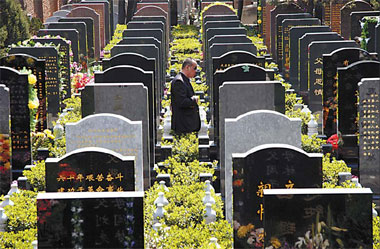 About 50,000 people pay respect to their deceased relatives in Fushouyuan, the biggest cemetery in Shanghai, yesterday. [Shanghai Daily]
About 50,000 people pay respect to their deceased relatives in Fushouyuan, the biggest cemetery in Shanghai, yesterday. [Shanghai Daily]
Chinese nationwide on Friday visited the tombs of family members and paid respect to the dead to mark Tomb-Sweeping Day, one of the three traditional festivals that have been included as public holidays starting this year.
In Huangling county, Shaanxi province, more than 8,000 people gathered in front of the Mausoleum of the Yellow Emperor to pay respect to the ancestor of the Chinese nation.
Visitors came from as far as Hong Kong, Macao and Taiwan.
They presented flowers and paid homage at the statue of the Yellow Emperor, who according to legend, invented the cart, boat, bow and arrow, as well as traditional Chinese medicine.
 A man pays his respects to deceased relatives at Babaoshan Cemetery in Beijing on Tomb-Sweeping Day, which fell on Friday. [China Daily]
A man pays his respects to deceased relatives at Babaoshan Cemetery in Beijing on Tomb-Sweeping Day, which fell on Friday. [China Daily]
"We received more visitors than before, and I think making Tomb-Sweeping Day a national public holiday has helped carry forward traditional culture," Jiang Wenhua, director of Huangling management bureau, said.
Other than Tomb-Sweeping Day, also known as Qingming Festival, the Dragon Boat Festival and the Mid-Autumn Festival have also been designated public holidays.
In Beijing, from early morning till 10:30 am, the capital's 75 tomb-sweeping sites received 439,000 visitors, the Beijing Evening News reported.
The Beijng Babaoshan Cemetery saw more than 30,000 people paying their respects to the dead, double the figure of last year.
As part of Qingming, thousands also gathered in the expanded Nanjing Memorial Hall of Compatriots Murdered in the Nanjing Massacre in the capital of Jiangsu province, to commemorate the 300,000 victims - mostly civilians - who were killed by Japanese aggressors in a six-week rampage of killing, burning, looting and raping, after they occupied the city in December 1937.
Joining the Chinese mourners in Nanjing were several Japanese, including Matsuoka Tamaki, a primary school teacher in her 60s from Osaka who has been to Nanjing more than 20 times.
"As citizens of Japan, inflictor of the war, we express our repentance at this special time," she said.
Friday also marked the public debut of the feature documentary Iris Chang: The Rape of Nanking, in 12 cinemas in Nanjing and Shanghai.
The film, sponsored by the Toronto chapter of the Association for Learning and Preserving the History of World War II in Asia (ALPHA), and Hong Kong-based Dadi Entertainment, focuses on the efforts of Chang as she uncovered the truth of the Nanjing Massacre and recounted the atrocity in her book The Rape of Nanking.
The film's box office proceeds will be donated to international organizations such as ALPHA, organizers said.
"Past experience, if not forgotten, is a guide for the future," She Ziqing, another Nanjing Massacre survivor who visited the memorial hall, said.
(China Daily April 5, 2008)